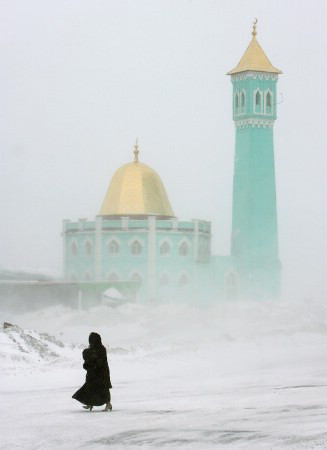
In the latest of an occasional series of columns about the parlous state of the city's transportation system, I thought that I'd venture out for a spin on one of the city's Metro Mini buses. You know the ones: those oddly shaped, orange guided missiles that steam around Jakarta's streets terrorizing and annoying other road users and pedestrians in equal measure.
Metro Minis, along with their green and white brothers, the Kopajas, are a familiar sight on the city's main arteries. I occasionally like to catch a Metro Mini for a 30 minute jaunt to Blok M for a shop which never fails to draw a few witticisms from the seemingly 14-year-old chain-smoking Konek (bus conductor) as he collects my fare.
The Metro Minis generally come in for a lot of stick from Jakarta's commuters. The drivers tend to block junctions and impede other road users by crawling at a snails pace around certain tight sections of road. The bus stops may as well not be there at all as your average Metro Mini will stop absolutely anywhere in search of that elusive extra passenger.
In their defense though, Metro Mini drivers and conductors not paid a salary and thus have to trawl for every single passenger they can get. If they were paid a wage like bus drivers in other countries then there would be no need for them to stop in the middle of junctions, provoking a fanfare of aggrieved car horns as they do so.
It would thus seem that the elites in charge are to blame. Their cheapskate approach to public services and amenities are once more in evidence here. If less money was skimmed off the top of the city budget then maybe we wouldn't have to put up with these loose cannons of mass transportation. I mean a coat of bright orange paint can't really hide the fact that these battered and bruised monsters belch lung scouring, eye stinging smoke into the environment and are so old they were probably left behind by the Japanese after World War II.
The issue of road safety is something else though and it is harder to excuse the MM drivers for tooling around like Lewis Hamilton after a heavy crack bender on purely financial grounds. They should perhaps go a bit easier on the Extra Joss and Krating Daeng energy drinks. Then again perhaps it's the cigarettes. Many drivers only need one match to start them off in the morning before a long day of chaining one cigarette off the other, punctuated by unpleasant expectorations of what we Brits call, "Dockers omelettes,” through the cab window.
Night-time brings its own Metro Mini hazards too as the powerful 2 Watt headlights and half a Watt taillights (which are obscured by thick black clouds of exhaust anyway) are switched on to full beam, turning the MMs into the invisible Stealth bombers of the streets.
All of this being the case, maybe it's safer to be inside a Metro Mini than outside of one. That's what I tell myself whenever I board one anyway. Today I jump on the bus and jam myself into a seat that gives me about 3 cm of space for my legs. The corrugated metal floor starts to heat up my feet and I settle into the full MM first class experience.

The city administration apparently wants to get petit bourgeois types out of their cars and onto public transportation. There's not much chance of that happening if the options are the overcrowded Busway or these old orange garbage cans on wheels. Class divisions are certain to continue to keep the moneyed off public transportation (that and the lack of air conditioning).
It's not impossible though to get middle-class people to give up driving into town if there's a viable working alternative. To take an example I'm familiar with, if you were to step on a London Tube train late in the evening the first thing that would strike you (apart from the appalling smell of stale urine perhaps) would be the amount of ‘posh’ people traveling home.
Back on our MM, a busker clambers on board with his Rp.50,000 acoustic guitar. The type it's impossible to tune properly. The metal strings cut into our busker's calloused fingers like cheese wire as he begins to sing. The voice isn't too bad although the mechanical limitations of his instrument begin to pall after a while.
Soon after this, the hawkers begin to board the bus with their cornucopia of knickknacks: pens, lighters, water and seven-week old squares of tofu. It's not much of a way to make a living and most of them traipse through the bus and straight out the back door like lemmings, hardly even stopping to see if anyone actually wants to buy their tat.
Eventually my stop arrives. Although it’s not much of a stop really as I, like most of my fellow Metro Mini passengers, are forced to leap kamikaze style into the traffic whilst the thing is still moving.... and there are people who laugh at me for riding a bicycle around Jakarta.







